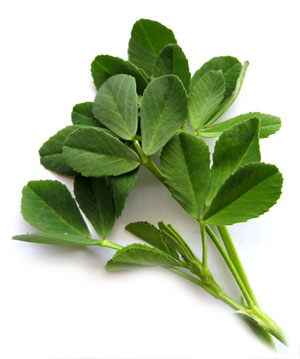|
Fenugreek (Methi)
(Trigonella foenum-graecum L.)
Description:
 Fenugreek, Trigonella foenum-graecum L., is an annual herb native to the Eastern Mediterranean and Asian regions. Undoubtedly one of the oldest cultivated medicinal plants, fenugreek (or commonly known as methi) is widely grown today in the Mediterranean countries, Argentina, France, India, North Africa, and the United States as a food, condiment, medicinal, dye, and forage plant. The plant reaches a height of 0.3 to 0.8 meters and has trifoliate leaves. White flowers appear in early summer and develop into long, slender, yellow-brown pods containing the brown seeds of fenugreek commerce. Fenugreek, Trigonella foenum-graecum L., is an annual herb native to the Eastern Mediterranean and Asian regions. Undoubtedly one of the oldest cultivated medicinal plants, fenugreek (or commonly known as methi) is widely grown today in the Mediterranean countries, Argentina, France, India, North Africa, and the United States as a food, condiment, medicinal, dye, and forage plant. The plant reaches a height of 0.3 to 0.8 meters and has trifoliate leaves. White flowers appear in early summer and develop into long, slender, yellow-brown pods containing the brown seeds of fenugreek commerce.
Uses:
Fenugreek is used both as an herb (the leaves) and as a spice (the seed). The yellow, rhombic fenugreek seed is frequently used in the preparation of pickles, curry powders and pastes, and is often encountered in the Arabic, Indian and Thailand cuisine. The young leaves of fenugreek are eaten as greens and the fresh or dried leaves are used to flavor several dishes. The dried leaves have a bitter taste and a strong characteristic smell which means they need to be used sparingly. Flour mixed with ground fenugreek makes a spicy bread. In India the roasted ground seeds are infused for a coffee substitute or adulterant. A tea can be made by infusing teaspoon of seed with two cups of water for five minutes.
Commercially, it is used in the preparation of mango chutneys and as a base for imitation maple syrup. In India it is used medicinally, and as a yellow dyestuff. It is also an oriental cattle fodder and is planted as a soil renovator because of its nitrogen fixing properties.
Fenugreek seeds contain hormone precursors that increase milk supply and breast size in women. It has been found that fenugreek can increase a nursing mother's milk supply within 24 to 72 hours after first taking the herb. Once an adequate level of milk production is reached, most women can discontinue the fenugreek and maintain the milk supply with adequate breast stimulation. Many women today take fenugreek in a pill form (ground seeds placed in capsules) but it can also be taken in tea form, although tea is believed to be less potent than the pills and the tea comes with a bitter taste that can be hard to stomach. However, fenugreek is not right for everyone. The herb has caused aggravated asthma symptoms in some women and has lowered blood glucose levels in some women with diabetes. Please read Dr. Ruth Lawrence's article Herbs and Breastfeeding for more information on fenugreek.
Medicinal Value:
Fenugreek is a digestive aid. As an emollient it is used in poultices for boils, cysts and other complaints. Because of its ability to reduce the sugar level of the blood, it is used in diabetes in conjunction with insulin. It also lowers blood pressure. Fenugreek relieves congestion, reduces inflammation and fights infection. Fenugreek contains natural expectorant properties ideal for treating sinus and lung congestion, and loosens & removes excess mucus and phlegm. Fenugreek is also an excellent source of selenium, an anti-radiant which helps the body utilize oxygen. It is a natural source of iron, silicon, sodium and thiamine. and acting as an expectorant, Fenugreek alleviates coughing, stimulates perspiration to reduce fevers, and is beneficial for treating allergies, bronchitis and congestion. In the East, beverages are made from the seed to ease stomach trouble.
Production and Packing:
In Cyprus, the seeding for the fresh produce harvest begins early in autumn through to March and the main commercial harvest period runs from November to early May. Fresh methi leaves are harvested in bunches of 180grms washed and pre-cooled before packing. They are packed either loose or in liner bags in cartons boxes and shipped to destination markets within 24 hrs from harvest. Shelf life is short since the leaves are tender and dehydrate quickly.
|